Mariah Carey
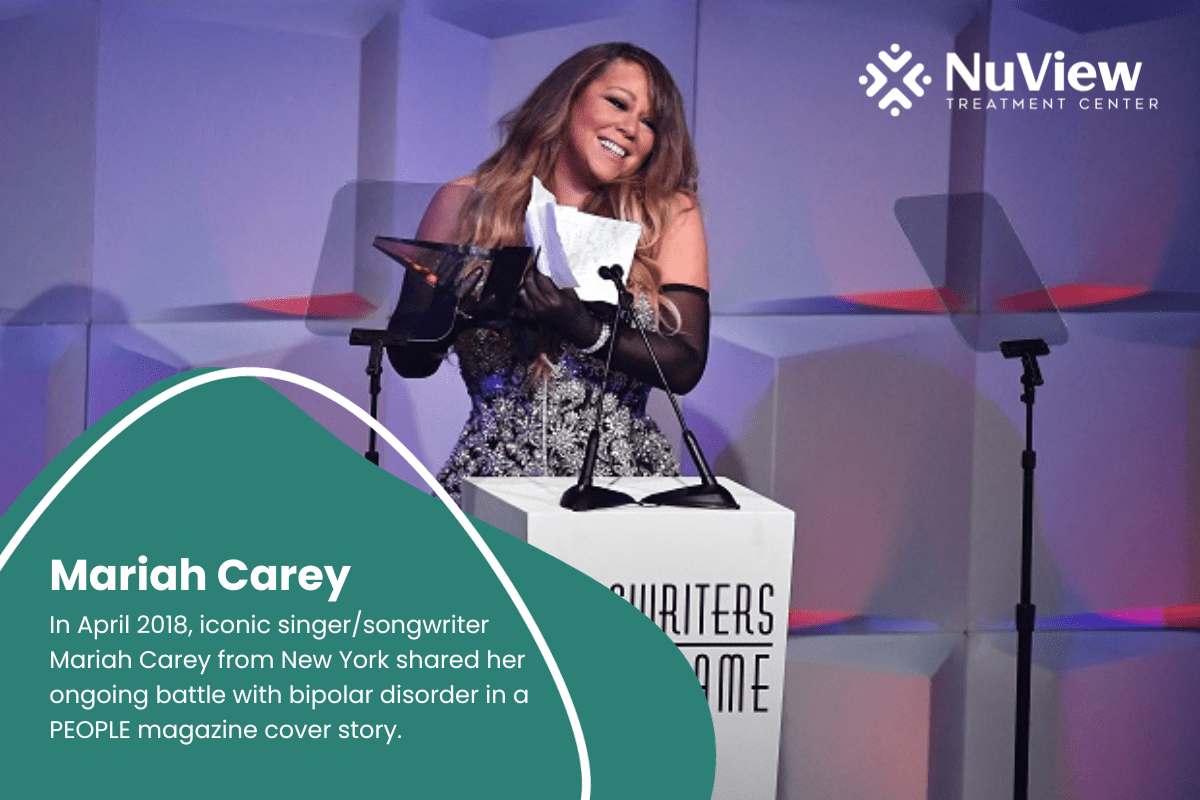
In April 2018, iconic singer/songwriter Mariah Carey from New York shared her ongoing battle with bipolar disorder in a PEOPLE magazine cover story. She received her bipolar disorder diagnosis in 2001 but struggled with acceptance.
Upon diagnosis, Mariah faced a severe mental and physical breakdown, forcing her to confront her condition's reality. She admitted, I didn't want to believe it. Stigma added to her reluctance to reveal her condition to the world, fearing it could harm her career.
For many years, Mariah lived in isolation and denial, suppressing her true feelings and negatively affecting her mental well-being.
However, after facing personal and professional challenges, Mariah addressed her diagnosis. She sought therapy and received treatment for bipolar II disorder, which involves cycles of depression and hypomania characterized by irritability, sleep issues, and hyperactivity.
Demi Lovato
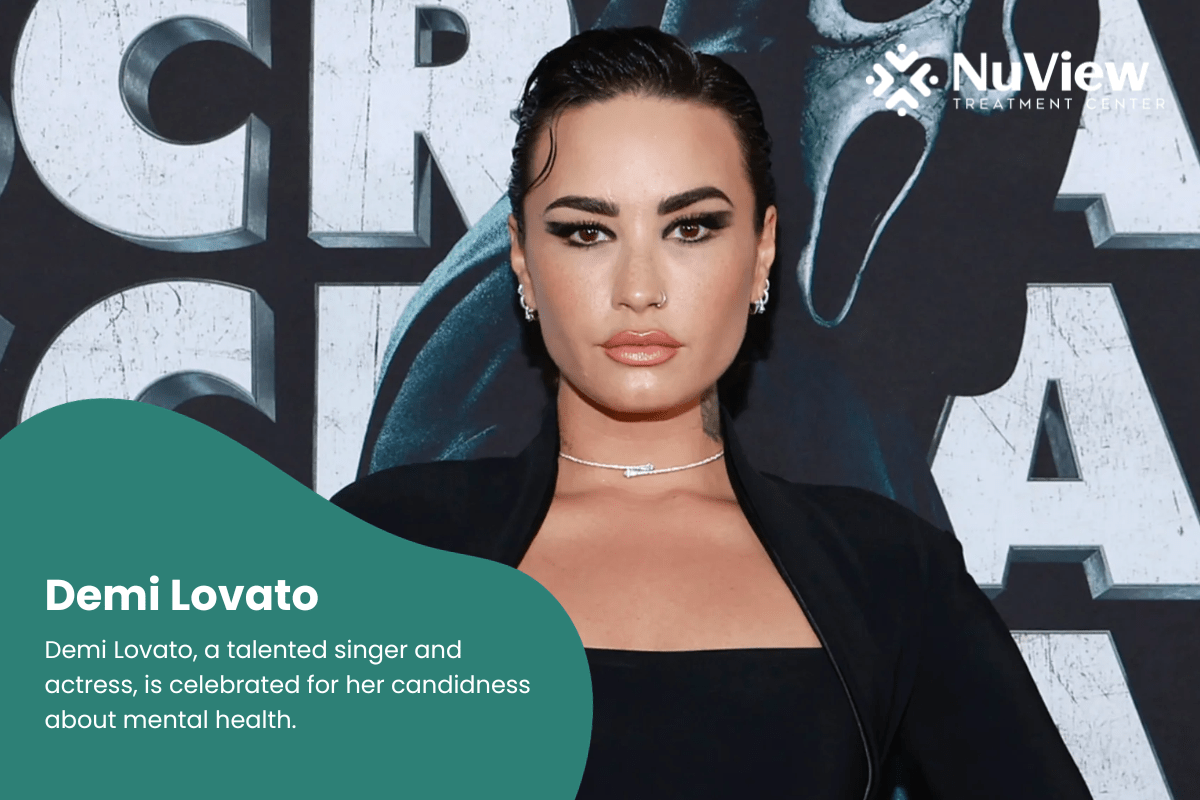
Demi Lovato, a talented singer and actress, is celebrated for her candidness about mental health. In 2011, she unveiled her bipolar disorder diagnosis, a pivotal moment in her mission to destigmatize mental health issues.
The turning point in Demi's life came when she was diagnosed with bipolar disorder. It was a profound relief for her. The diagnosis came during her treatment for eating disorders, unveiling years of wrestling with severe depression and enduring extreme lows despite numerous opportunities.
Receiving the bipolar diagnosis was transformative, bringing a sense of control to her life. Despite her early success, Demi struggled with mental health challenges and understanding her emotional state.
Halsey
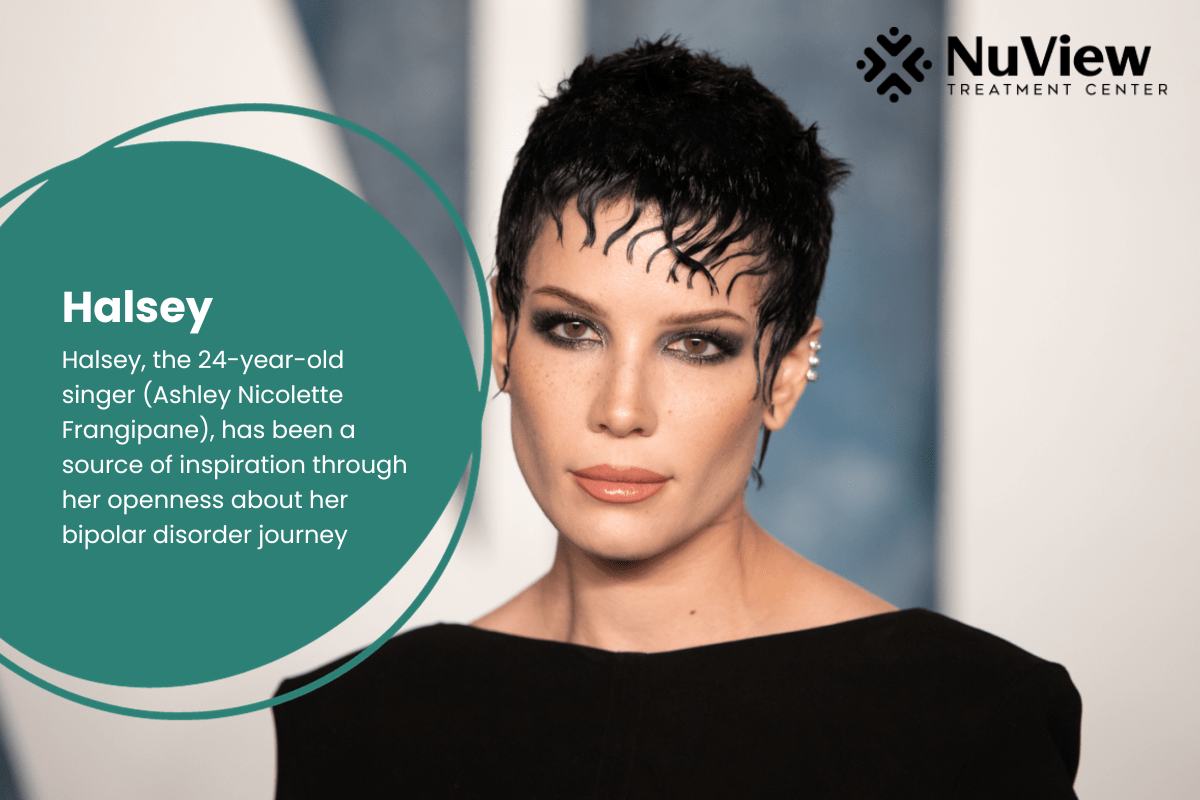
Halsey, the 24-year-old singer (Ashley Nicolette Frangipane), has been a source of inspiration through her openness about her bipolar disorder journey. Diagnosed at just 17, she's since undertaken a path of understanding, acceptance, and resilience.
In a candid interview with Rolling Stone in June 2019, Halsey shared her experiences living with bipolar disorder, revealing that she had voluntarily committed herself to psychiatric hospital care on two occasions to manage the manic-depressive episodes associated with the condition proactively.
Her decision to share this deeply personal aspect of her life underscores her strength and commitment to reducing mental health stigma.
Halsey's rapid ascent to fame and newfound financial security played a pivotal role in her journey to better mental health, making her feel more accountable and aiding her in managing bipolar disorder.
An exceptional aspect of Halsey's story is how her bipolar episodes have influenced her artistic expression. Her emotional fluctuations have profoundly impacted her creative process, oscillating between manic highs and depressive lows.
In a more intimate conversation on YouTube, Halsey delved deeper into her bipolar disorder experience, sharing the lessons she learned since her childhood diagnosis. Through her story, she offers a window into her journey and provides an educational platform for those facing similar challenges.
Selena Gomez
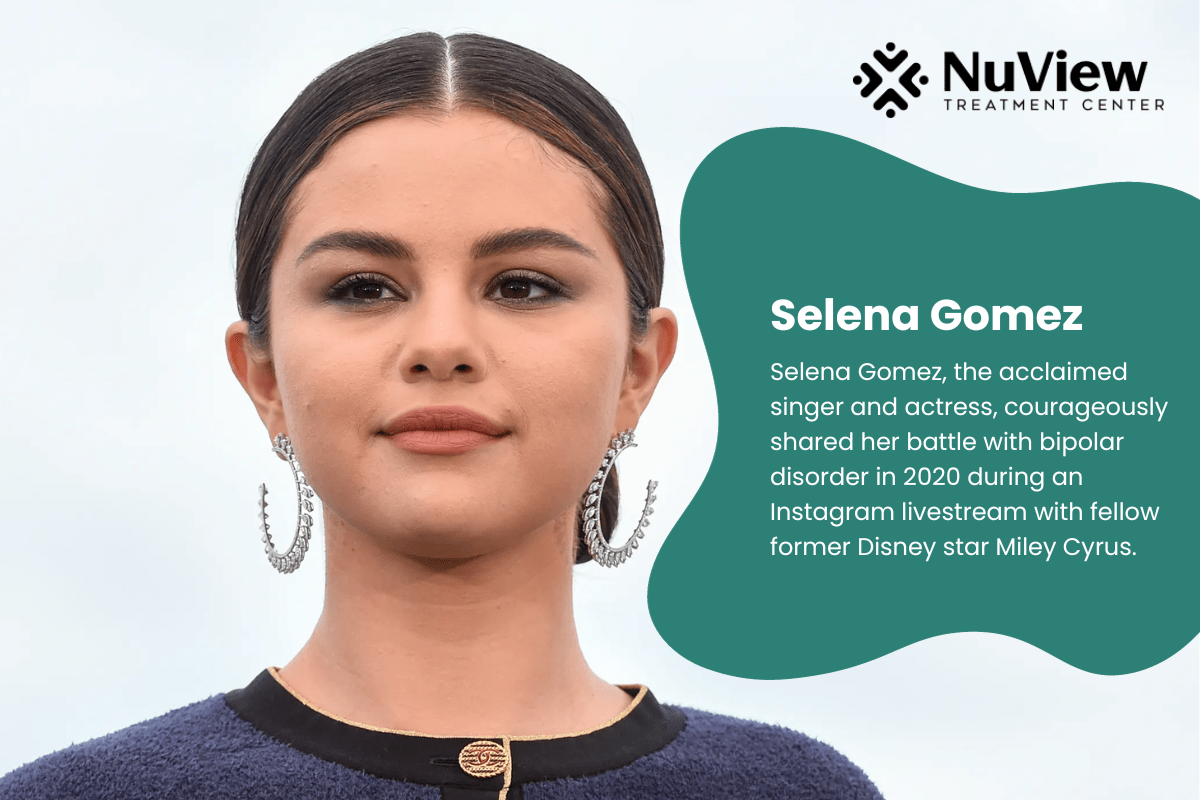
Selena Gomez, the acclaimed singer and actress, courageously shared her battle with bipolar disorder in 2020 during an Instagram livestream with fellow former Disney star Miley Cyrus. In her conversation with Rolling Stone, she emphasized her responsibility to use her platform for a greater purpose: breaking the stigma surrounding mental health.
Personal challenges marked Gomez's journey to this revelation. In 2018, during her Revival tour, she began hearing distressing voices and entered a state of psychosis, yet she remained uncertain about the cause. Her assistant, Theresa, recounted the terrifying experience, with voices growing louder and paranoia taking hold.
Gomez checked into a treatment center, where she finally received her bipolar disorder diagnosis, clarifying her struggles.
Catherine Zeta-Jones
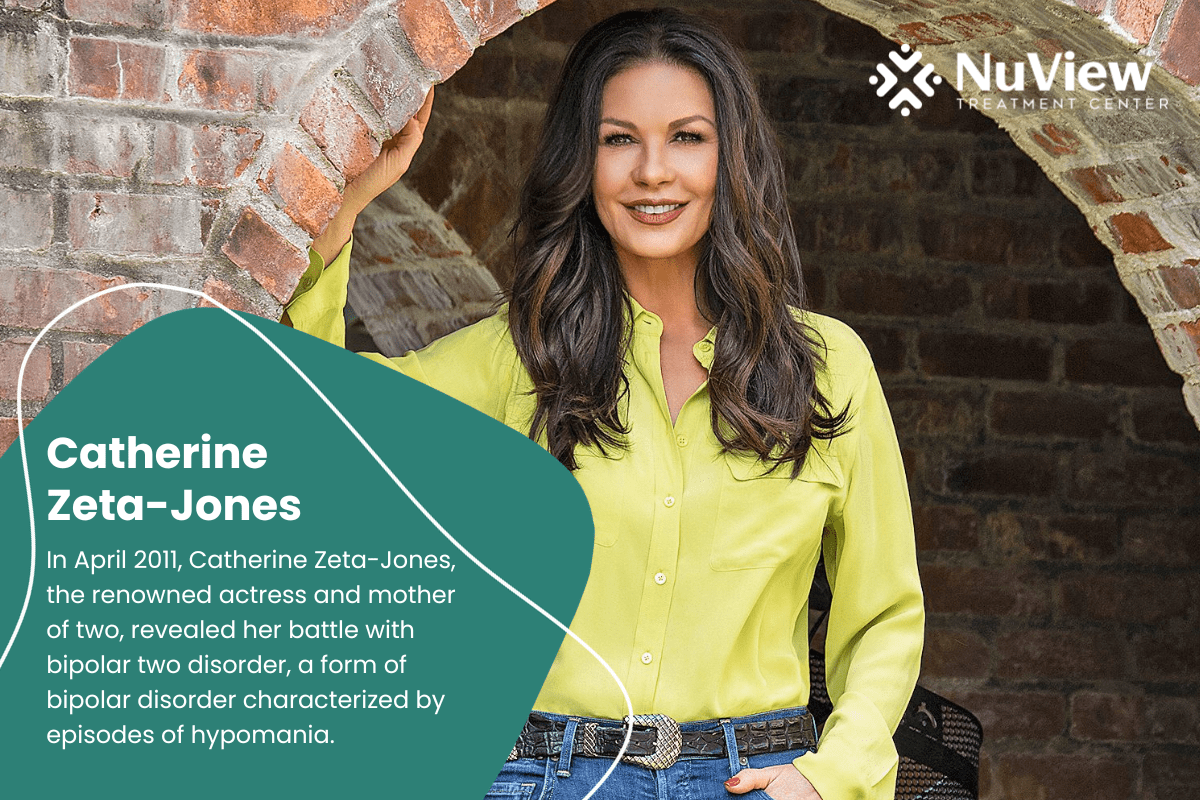
In April 2011, Catherine Zeta-Jones, the renowned actress and mother of two, revealed her battle with bipolar two disorder, a form of bipolar disorder characterized by episodes of hypomania, which involve less severe highs and irritability compared to full manic episodes, alternating with periods of depression.
This open acknowledgment of her mental health challenges aimed to combat the stigma associated with bipolar disorder. At 43, she sought treatment, spending five days in a mental health clinic after months of worry. Her diagnosis of bipolar disorder II came during this time, marking a turning point in her journey.
Catherine Zeta-Jones' candidness is a powerful message against the stigma surrounding mental illnesses and offers support and hope to others facing similar challenges.
Kanye West

In 2016, Kanye West, aged 43, received a diagnosis of bipolar disorder, and notable public events have marked his journey with this condition.
He made headlines when he announced his presidential candidacy on the Fourth of July and gave an extensive interview to Forbes magazine, sharing unconventional plans and statements.
In a 2019 interview with Vogue, his wife, Kim Kardashian-West, discussed his initial struggle to accept the bipolar diagnosis. Instead, he attributed his issues to sleep deprivation.
Eventually, he embraced the diagnosis and set out to demonstrate that leading an everyday life with a mental illness is possible. Although the process was emotionally challenging, their current situation is relatively stable.
Notably, West has chosen not to incorporate medication for mental health disorders into his treatment plan, believing it significantly alters his identity. He has described the experiences during manic episodes, including racing thoughts, irritability, sleep disruptions, and paranoia, sometimes escalating to psychosis.
During these episodes of bipolar schizoaffective disorder, he often experiences heightened paranoia and subscribes to conspiracy theories, such as government-installed chips in people's heads and constant surveillance.
Get Started With Nuview Treatment Center
Our dedicated professional staff is here to guide you or your loved one on the journey to lasting recovery, offering support every step of the way.
Carrie Fisher
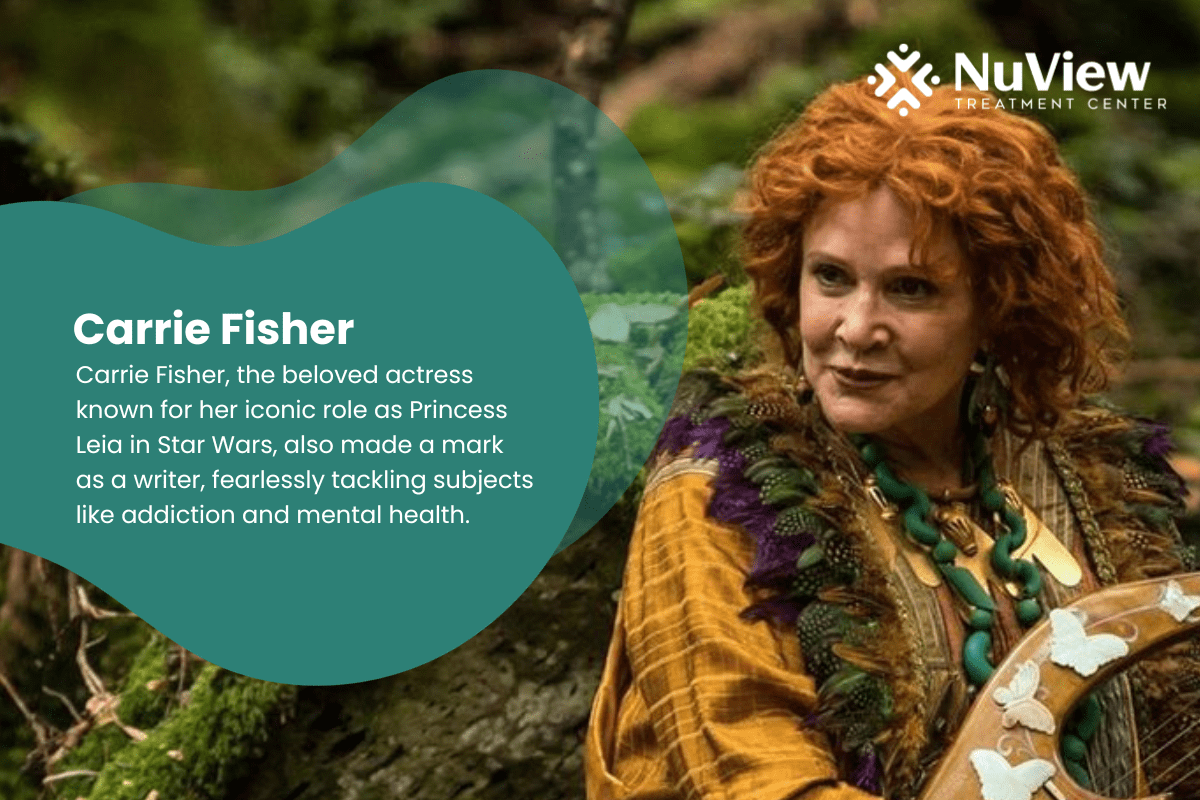
Carrie Fisher, the beloved actress known for her iconic role as Princess Leia in Star Wars, also made a mark as a writer, fearlessly tackling subjects like addiction and mental health.
Her open acknowledgment of her struggles set her apart, which included bipolar disorder, alcoholism, drug addiction, and body dysmorphia.
Her battle with bipolar disorder started with a diagnosis in her mid-twenties, but she initially resisted it. She began to embrace her diagnosis after achieving sobriety at 28 following a near-fatal overdose.
This turning point came when she voluntarily entered a 30-day rehab program, realizing nothing else could explain her past behavior.
Fisher's willingness to share her journey helped destigmatize these issues, showing that individuals, regardless of their talents, can triumph over challenges and contribute to greater understanding and acceptance.
Jean-Claude Van Damme
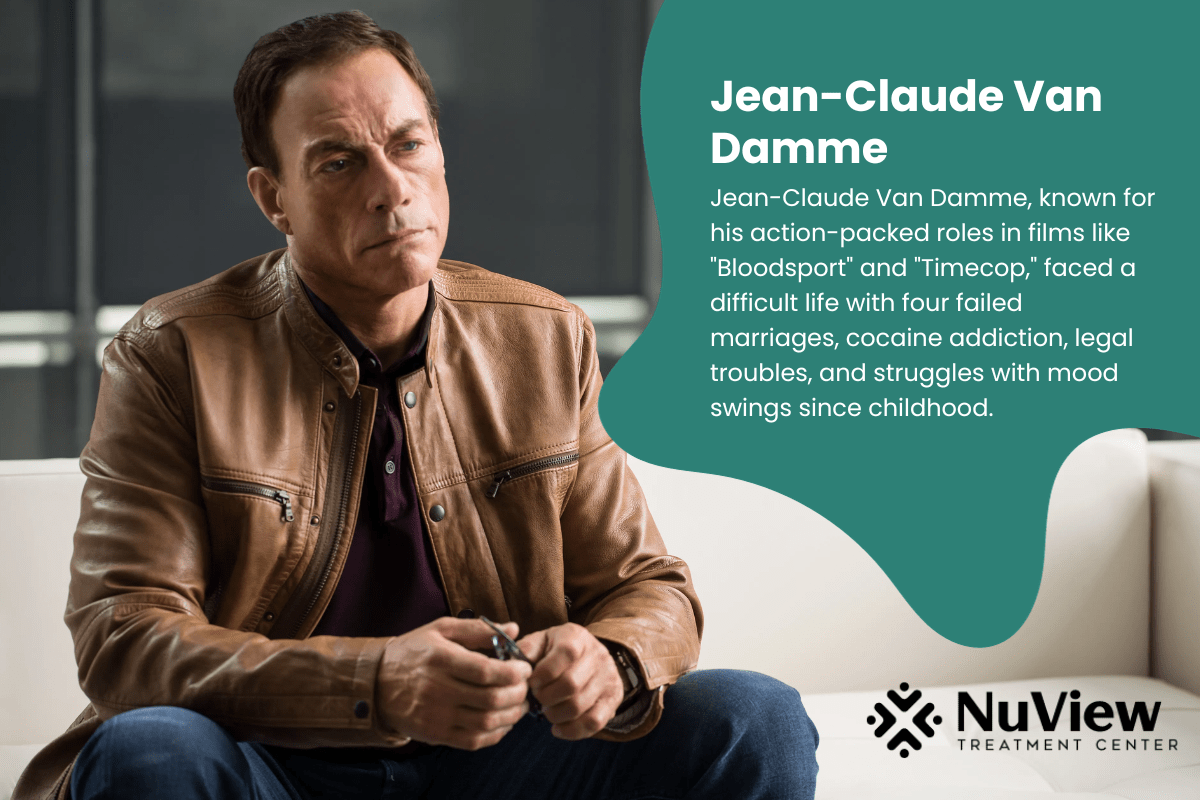
Jean-Claude Van Damme, known for his action-packed roles in films like Bloodsport and Timecop, faced a difficult life with four failed marriages, cocaine addiction, legal troubles, and struggles with mood swings since childhood.
It wasn't until 2011 that he was diagnosed with rapid-cycling bipolar disorder, characterized by intense mood swings. This diagnosis shed light on his life battling bipolar disorder.
Mel Gibson
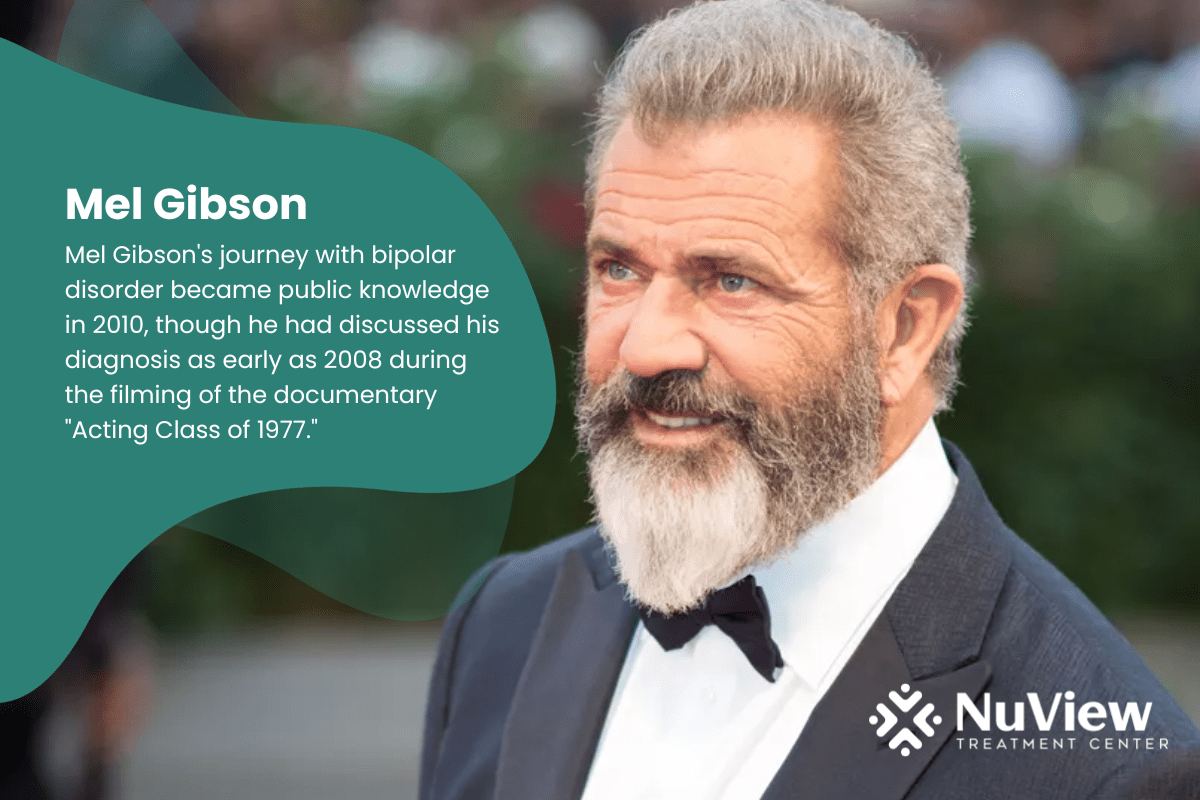
Mel Gibson's journey with bipolar disorder became public knowledge in 2010, though he had discussed his diagnosis as early as 2008 during the filming of the documentary Acting Class of 1977.
In the documentary, Gibson shared his experiences with good highs and very low lows, shedding light on the bipolar condition he had been living with.
Gibson's struggle with alcoholism, including incidents like consuming five pints of beer for breakfast and a 2006 drunk driving arrest, further emphasized his challenges.
Despite attributing anti-Semitic comments to moments of insanity, his bipolar diagnosis has played a significant role in his life, even if he has rarely discussed it in recent years.
Richard Dreyfuss
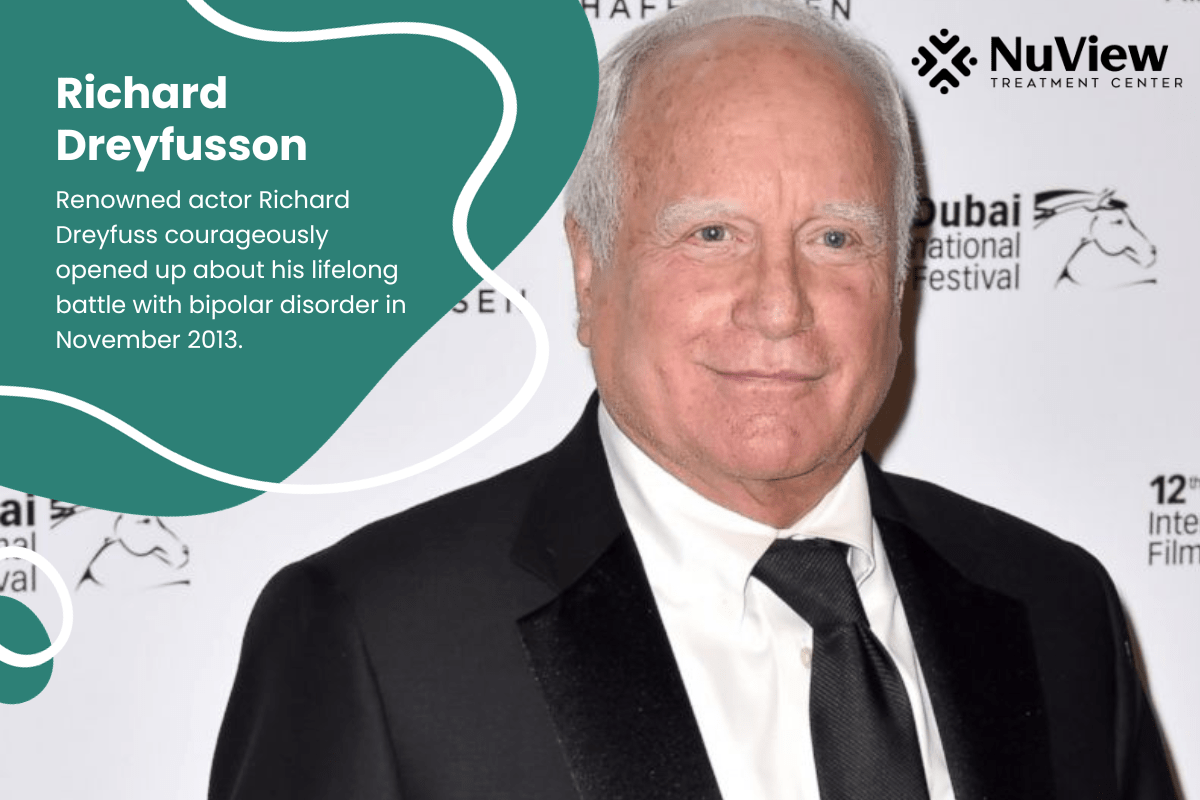
Renowned actor Richard Dreyfuss courageously opened up about his lifelong battle with bipolar disorder in November 2013. Sharing his story, he aimed to eliminate the stigma surrounding this condition, emphasizing that it's nothing to be concealed.
Dreyfuss recalled experiencing extreme mood swings as early as age 14, but it wasn't until his late 40s in 1995 that he sought treatment from a therapist to address his illness. He embarked on a four-year journey to find the proper medication, ultimately helping him reclaim his life.
Linda Hamilton

Actress Linda Hamilton, celebrated for her role along side Arnold Schwarzenegger, disclosed her battle with bipolar disorder in 2004. This mental health condition, characterized by extreme mood swings, was a lifelong challenge for her.
Struggling with depression since childhood and contending with compulsive eating, it took until her adulthood in 1994 to receive an official diagnosis.
For two decades, she explored various therapies and treatments in search of answers. Once she came to terms with her bipolar disorder and gained control over it, Hamilton decided to discuss it publicly.
Her goal was to assist others by sharing the strategies that have proven effective for her, which include regular exercise and a balanced diet.
Frank Bruno

Boxing legend Frank Bruno has faced a long-standing battle with depression and bipolar disorder, which he has candidly shared for years. Unfortunately, in 2020, he experienced a relapse in his ongoing struggle with mental health after losing four lifelong friends to the COVID-19 pandemic.
Bruno's open discussions about his mental health challenges have brought awareness to these issues and inspired many who confront similar battles.
Get Started With Nuview Treatment Center
Stephen Fry
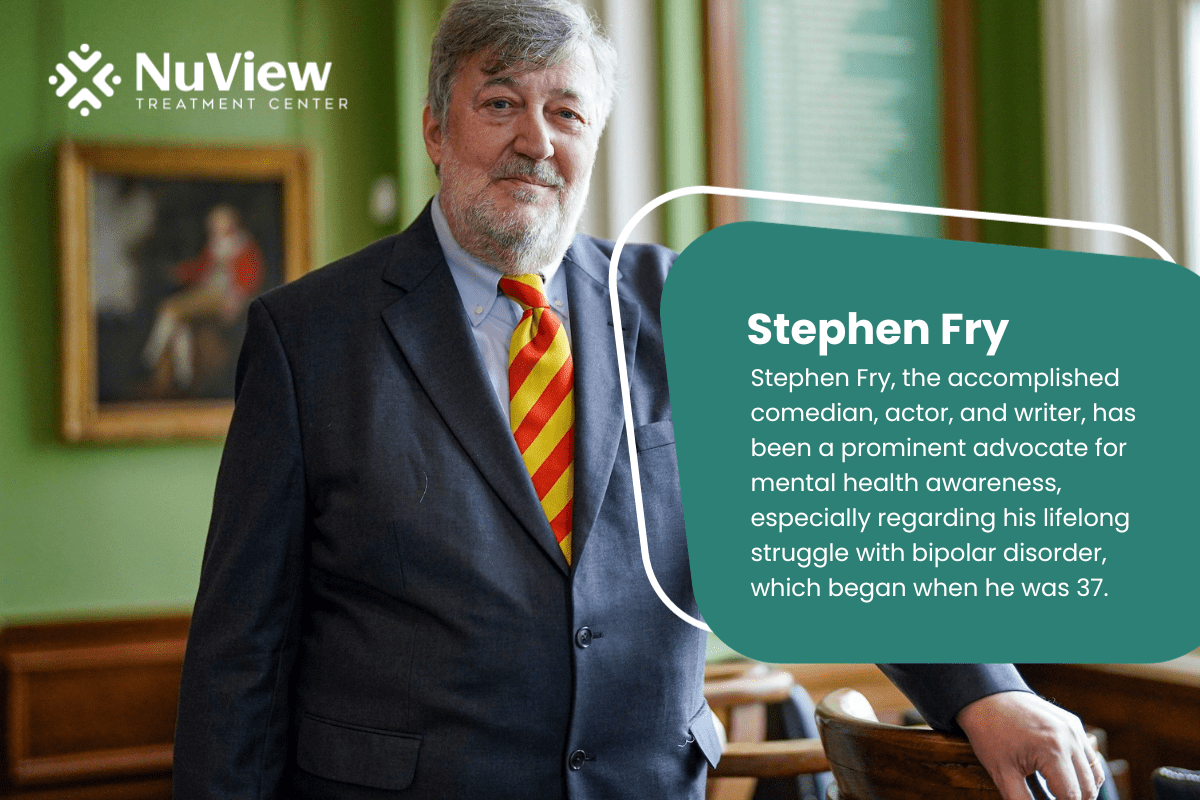
Stephen Fry, the accomplished comedian, actor, and writer, has been a prominent advocate for mental health awareness, especially regarding his lifelong struggle with bipolar disorder, which began when he was 37.
Fry's commitment to mental health is evident through his work, including the 2006 documentary Stephen Fry: The Secret Life of the Manic Depressive, and his role as the mental health charity Mind president in 2011.
During an appearance on Fearne Cotton's Happy Place podcast in March 2018, Fry discussed how bipolar disorder affects his life. He recognized the risk of being perceived as professionally mentally unstable but emphasized that it's a condition he lives with, not his defining identity.
Fry's openness has significantly impacted mental health awareness and helped destigmatize bipolar disorder, providing valuable support to those facing similar challenges.
Sinead O'Connor
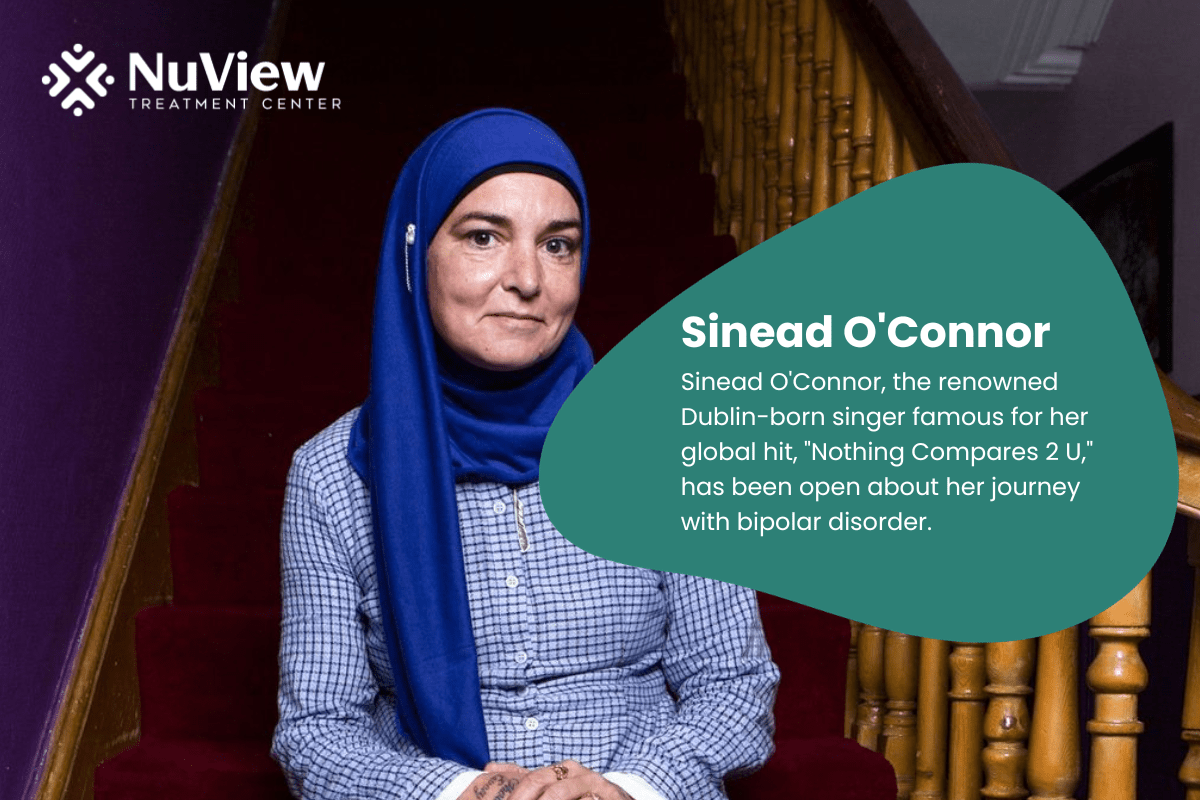
Sinead O'Connor, the renowned Dublin-born singer famous for her global hit, Nothing Compares 2 U, has been open about her journey with bipolar disorder.
She shared her experience during an interview with Oprah Winfrey in 2007, describing herself as a work in progress since her diagnosis four years earlier. O'Connor emphasized the significance of medication and therapy in managing her condition.
In addition to bipolar disorder, O'Connor faced other mental health challenges, including post-traumatic stress disorder (PTSD) and borderline personality disorder. She used her platform to speak openly about mental health, sharing her struggles with suicidal thoughts and advocating for checking in on anyone who might be facing similar difficulties.
O'Connor acquired valuable skills throughout her therapy that helped her understand her triggers and violent emotional contradictions. In 2017, she highlighted the vulnerability of individuals dealing with mental illness and called for increased support and understanding, emphasizing, You've got to take care of us. We're not like everybody.
Kurt Cobain
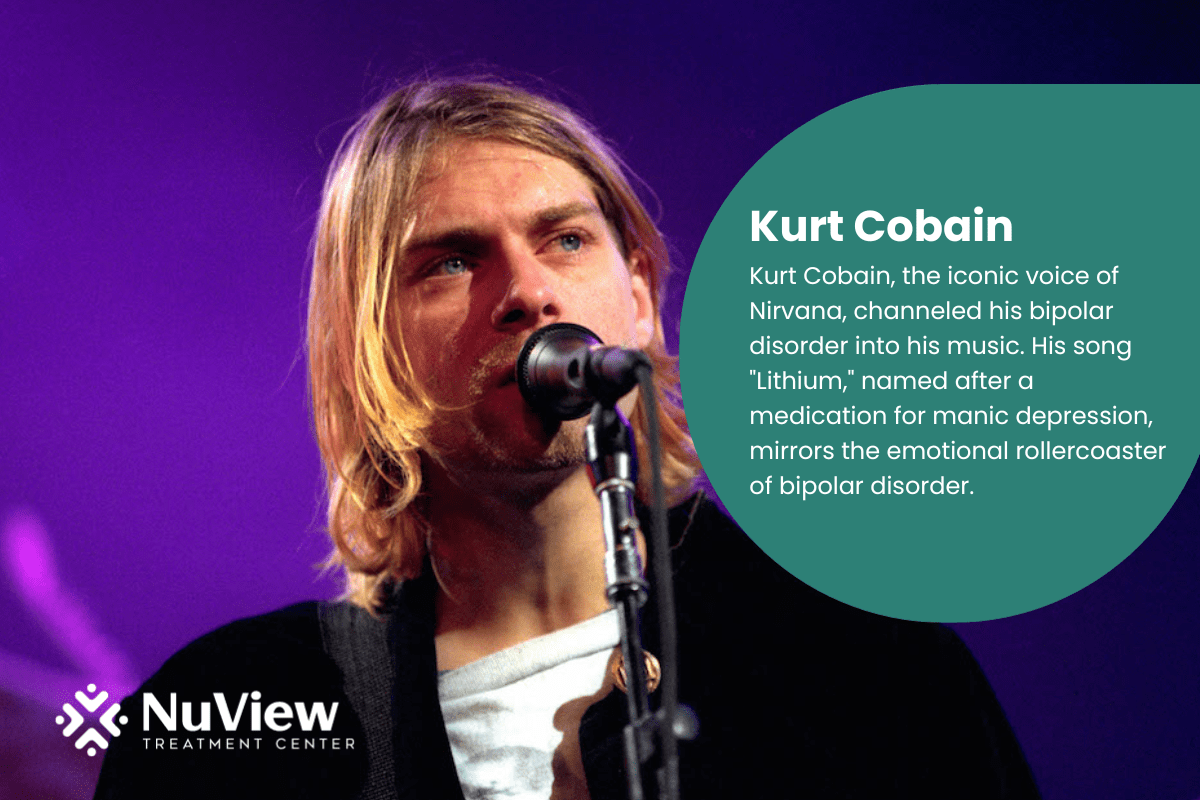
Kurt Cobain, the iconic voice of Nirvana, channeled his bipolar disorder into his music. His song Lithium, named after a medication for manic depression, mirrors the emotional rollercoaster of bipolar disorder. Although there's no evidence he used lithium, his lyrics capture the condition's mood swings.
Kurt's mental health journey began with an ADD diagnosis in childhood, later evolving into bipolar disorder.
In Radio Friendly Unit Shifter, he repeatedly asks, What is wrong with me? and mentions bipolar opposites attract, reflecting the bipolar tendencies in his creativity.
During manic phases, his lyrics took unusual and nonsensical turns, exemplified by Smells Like Teen Spirit with lines like a mulatto, an albino, a mosquito, my libido. Kurt's music was a rock revolution reflecting his bipolar journey.
Amy Winehouse
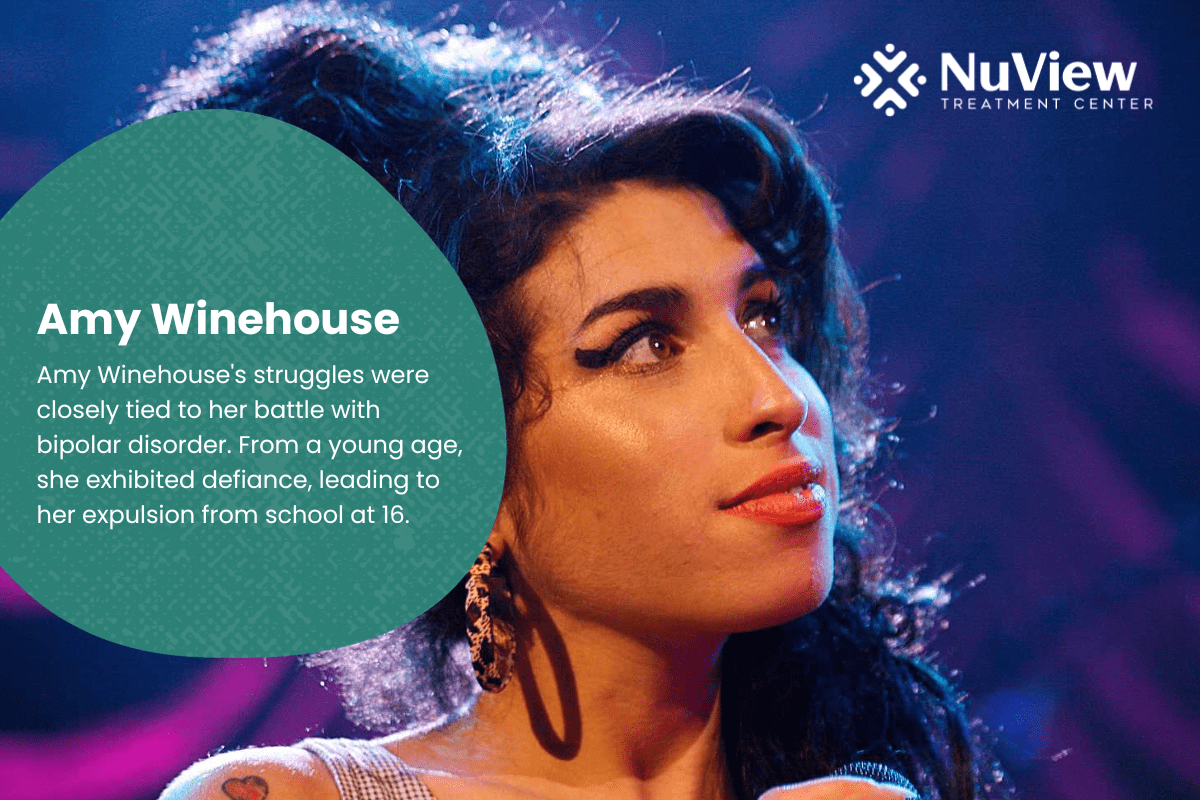
Amy Winehouse's struggles were closely tied to her battle with bipolar disorder. From a young age, she exhibited defiance, leading to her expulsion from school at 16.
Her self-doubt, negative body image, bulimia, and self-mutilation, particularly cutting her arms and legs, were manifestations of her bipolar condition. Additionally, she displayed signs of borderline personality disorder, such as a fear of abandonment, co-dependent relationships, impulsivity, and anger management issues. These challenges proved too heavy a burden for her to bear.
Winehouse's life and art were profoundly impacted by her bipolar journey, making her a poignant example of these challenges.
Britney Spears
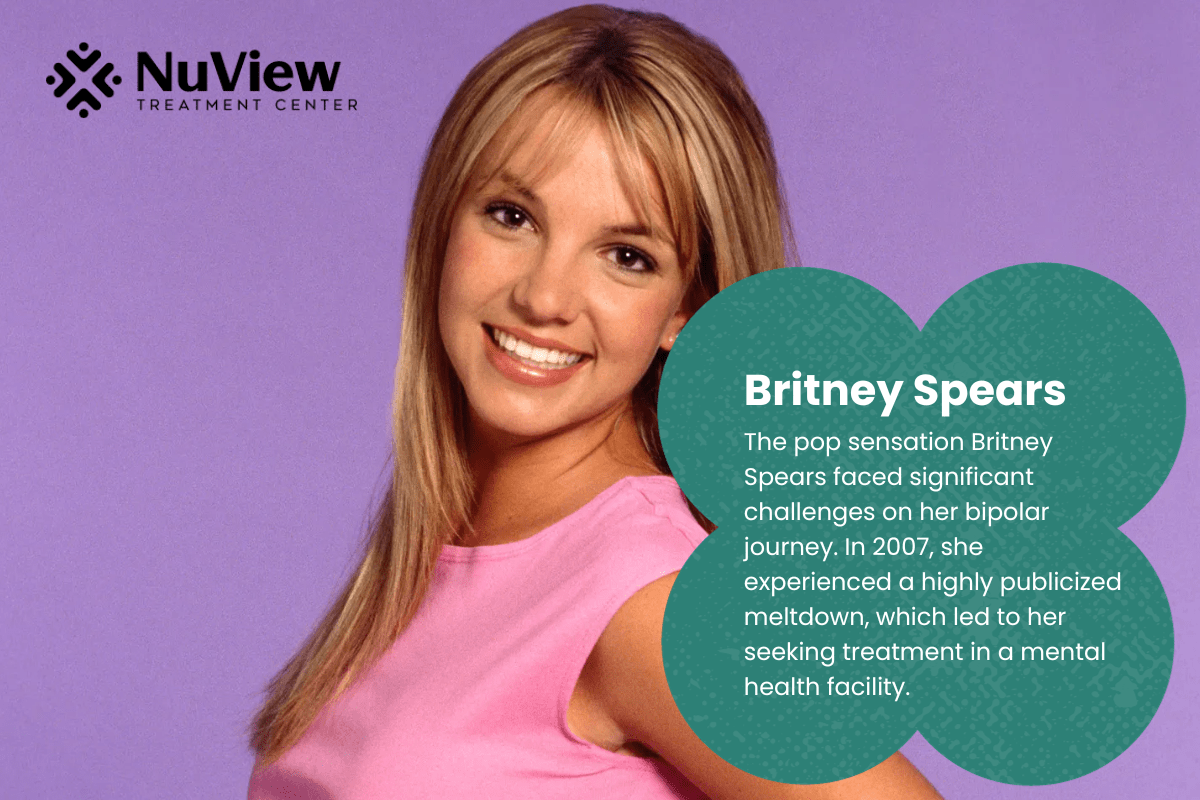
The pop sensation Britney Spears faced significant challenges on her bipolar journey. In 2007, she experienced a highly publicized meltdown, which led to her seeking treatment in a mental health facility.
During this time, she even faced legal battles related to the custody of her two sons. Following these problematic events, she received a bipolar disorder diagnosis.
Britney Spears' story sheds light on the importance of mental health awareness and the need for support systems for individuals dealing with bipolar disorder.
Robin Williams
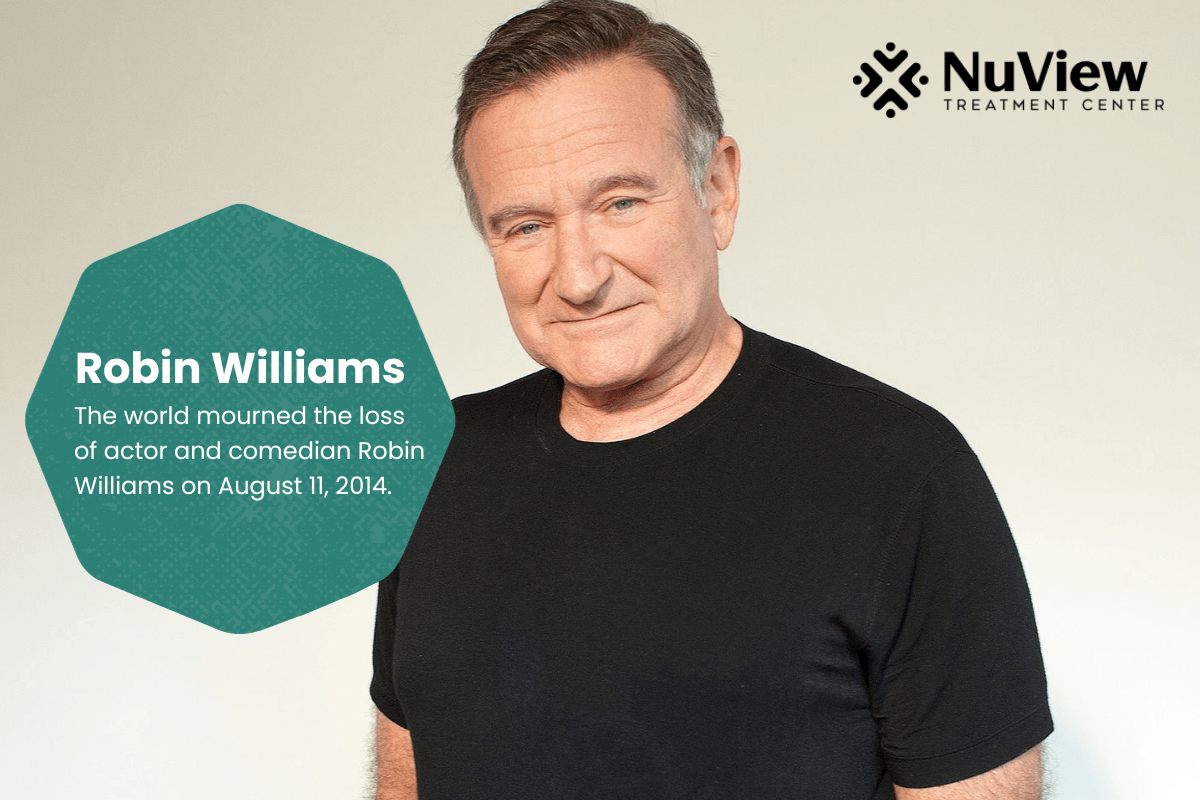
The world mourned the loss of actor and comedian Robin Williams on August 11, 2014. While renowned for his humor and talent, Williams silently fought a fierce battle with bipolar disorder and depression.
Williams struggled with mental health issues, including a relapse into alcoholism in 2003 after 20 years of sobriety. His battle with alcohol continued for three years before he sought professional help and entered rehab in 2006.
Alongside his fight against addiction, he also confronted bipolar disorder, a condition characterized by intense mood swings. In July 2014, he made the courageous choice to re-enter rehab to reaffirm his commitment to sobriety.
Vincent van Gogh
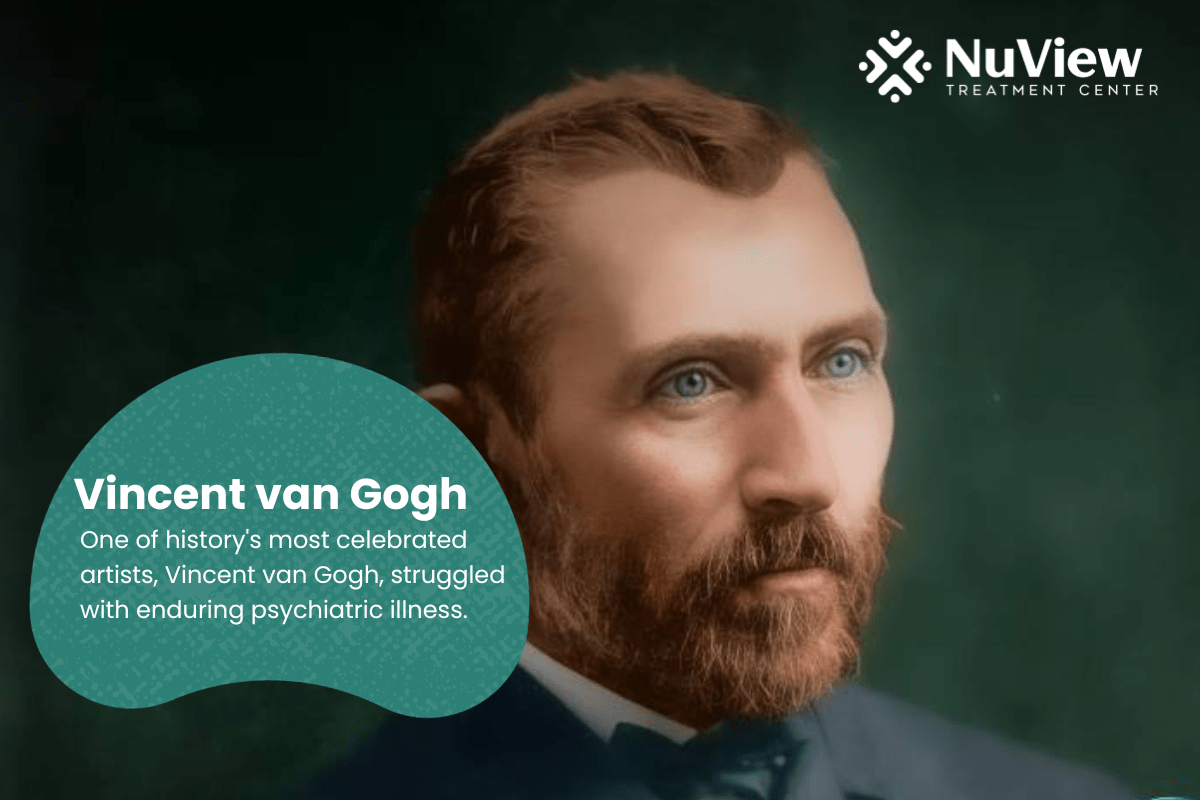
One of history's most celebrated artists, Vincent van Gogh, struggled with enduring psychiatric illness. His battle with mental health, often resembling symptoms of manic depression or bipolar disorder, left an indelible mark on his remarkable artistic journey.
Van Gogh's mental health struggles invaded his life, impacting his well-being and creative output. His story serves as a sobering reminder that even those gifted with extraordinary talents can confront the profound challenges of mental health.
In 1890, van Gogh tragically succumbed to his inner demons, highlighting the need to address mental health issues, even in individuals whose creative brilliance has enriched the world.
Winston Churchill

Winston Churchill, renowned as a 20th-century leader, struggled with a hidden adversary—bipolar disorder. This emotional rollercoaster featured profound lows, fleeting manic episodes, and the ever-present metaphorical "black dog."
Churchill's physician, Lord Moran, identified the classic signs: suicidal thoughts, cyclical mania, and decreased need for sleep. In Moran's memoir, "Winston Churchill: The Struggle for Survival," he revealed Churchill's bipolar disorder diagnosis. The "black dog" symbolized extended periods of weakening depression marked by low energy, waning interests, appetite loss, and concentration difficulties.
Intermittent with these depressive phases were bursts of manic energy and restlessness. During these high-productivity phases, Churchill worked from 8 a.m. to 2 a.m. Unfortunately, these episodes invariably gave way to the return of his "black dog."
NuView Treatment Center: Your Partner for Substance Use and Mental Health Support
At NuView Treatment Center, we offer evidence-based treatments for substance use and mental health disorders, including bipolar disorder, while providing unwavering support for your concerns.
Our mission is clear: to deliver comprehensive care for substance use disorders, mental health disorders, and dual diagnoses.
With diverse medical services and dedicated case management, we tailor our approach to meet your unique challenges and requirements and put positive people around you to support your journey.
Your path to wellness starts with us. If you're ready to take the first step or have questions about our services, please don't hesitate to contact us. Our compassionate team is here to guide you through the journey to recovery.
People Also Search:
Bipolar Mania | Can Bipolar Be Cured | Bipolar vs Schizophrenia | Bipolar Disorder Saying Hurtful Things | BPD vs Bipolar | ADHD vs Bipolar | Rapid Cycling Bipolar | Trileptal For Bipolar | Bipolar Medication | How A Person With Bipolar Thinks | Lithium For Bipolar Disorder | Arguing With A Bipolar Person | Bipolar With Psychotic Features | Types Of Bipolar
- Mariah Carey
- Demi Lovato
- Halsey
- Selena Gomez
- Catherine Zeta-Jones
- Kanye West
- Carrie Fisher
- Jean-Claude Van Damme
- Mel Gibson
- Richard Dreyfuss
- Linda Hamilton
- Frank Bruno
- Stephen Fry
- Sinead O'Connor
- Kurt Cobain
- Amy Winehouse
- Britney Spears
- Robin Williams
- Vincent van Gogh
- Winston Churchill
- Mariah Carey
- Demi Lovato
- Halsey
- Selena Gomez
- Catherine Zeta-Jones
- Kanye West
- Carrie Fisher
- Jean-Claude Van Damme
- Mel Gibson
- Richard Dreyfuss
- Linda Hamilton
- Frank Bruno
- Stephen Fry
- Sinead O'Connor
- Kurt Cobain
- Amy Winehouse
- Britney Spears
- Robin Williams
- Vincent van Gogh
- Winston Churchill
Get Help Today!
Kerner B. (2014). Genetics of bipolar disorder.The application of clinical genetics, 7, 33–42. https://doi.org/10.2147/TACG.S39297
Jain, A., & Mitra, P. (2023). Bipolar Disorder. In StatPearls. StatPearls Publishing.
Phillips, M. L., & Kupfer, D. J. (2013). Bipolar disorder diagnosis: challenges and future directions. Lancet (London, England), 381(9878), 1663–1671. https://doi.org/10.1016/S0140-6736(13)60989-7
National Collaborating Centre for Mental Health (UK). Borderline Personality Disorder: Treatment and Management. Leicester (UK): British Psychological Society (UK); 2009. (NICE Clinical Guidelines, No. 78.) 2, BORDERLINE PERSONALITY DISORDER. Available from: https://www.ncbi.nlm.nih.gov/books/NBK55415/
Everyone is Welcome Here and We All Have Your Back
Your healing journey deserves a personalized approach. At NuView, we integrate expertise in behavioral therapy, mental health, and substance use treatment to create a customized recovery plan tailored to your unique needs.
Connect with our Admissions Specialists today.

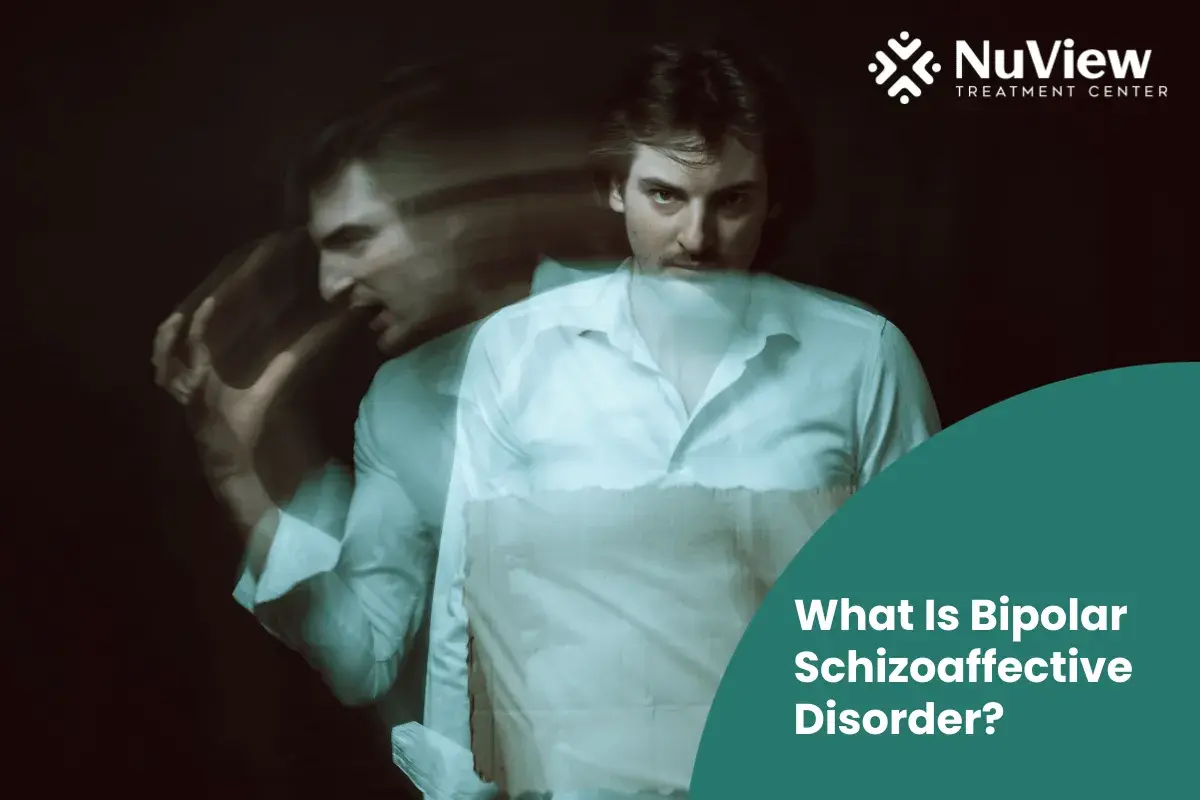
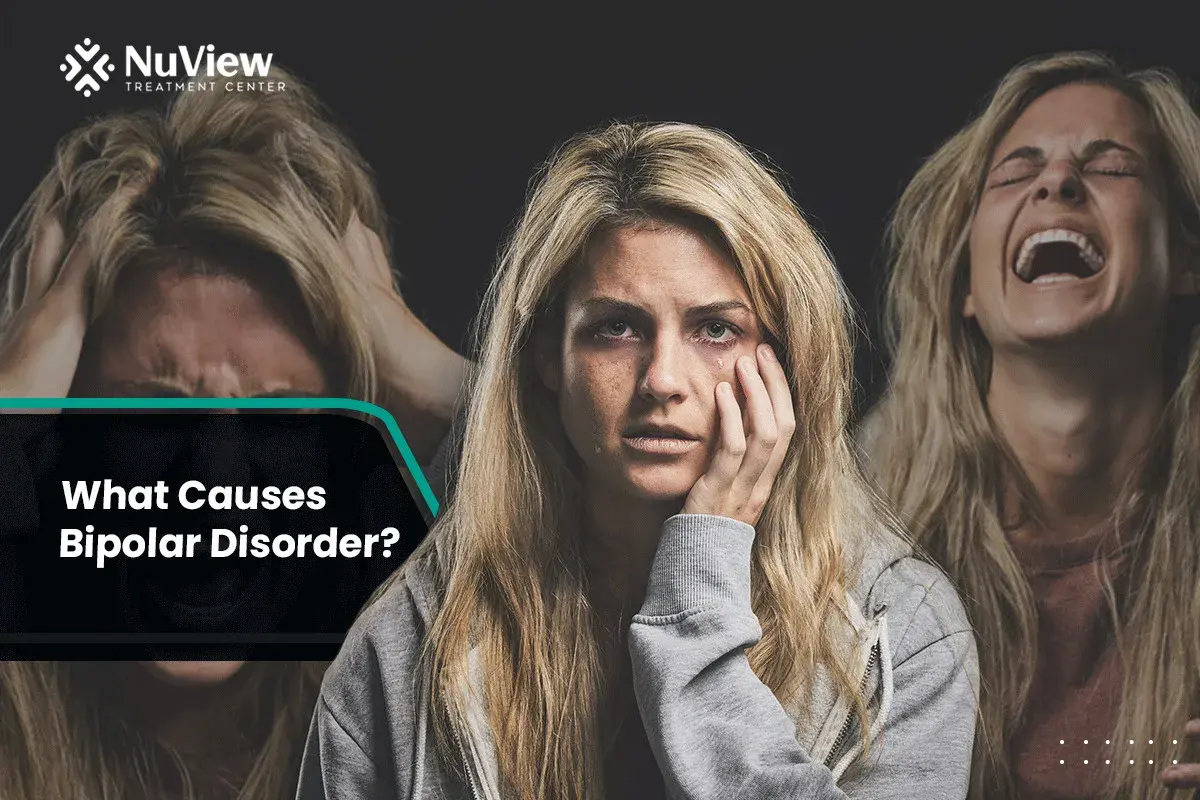
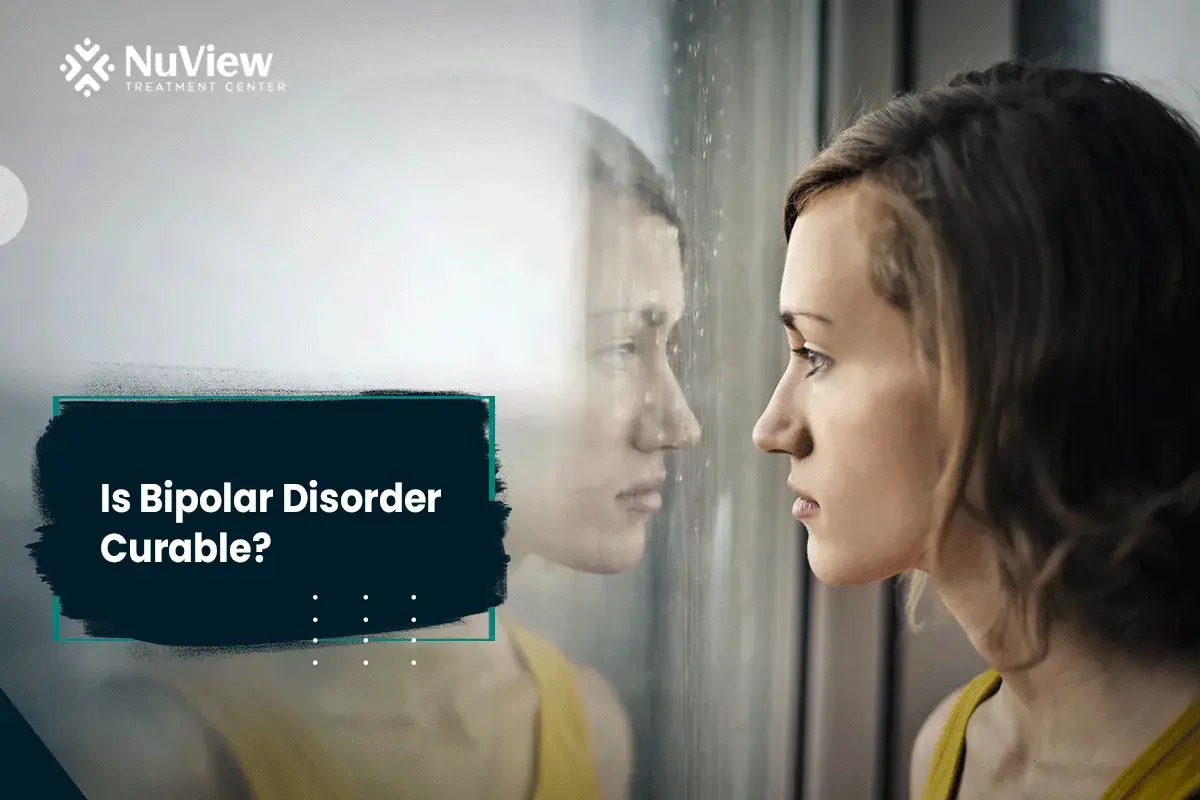



Written By
Dr. Ryan Peterson